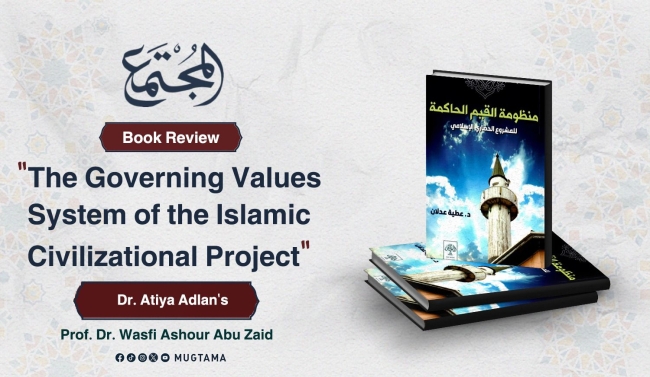Note: This book "The Governing Values of the Islamic Civilizational Project" is the first in a series of books by the author, published by Dar Al-Usul Al-Ilmiyya in Istanbul, first edition in 2025. The book, as stated on page 128:
"This book prioritizes the high normative values distinguished by the Islamic nation, those governing values that control the interpretation of general human values and determine the overall direction of life systems; whether political, economic, social, scientific, educational, and others. The treatment of these values is not in their doctrinal aspect, but rather specifically in their value aspect."
What the Islamic Movement Lacks
The Journey of the Islamic Movement
The Islamic movement, with the Muslim Brotherhood at its core, has been around for nearly a century. Over this time, the movement has made significant efforts and left notable impacts, yielding fruitful results in faith, education, advocacy, politics, organization, and charity. It has produced cadres that have filled the horizon, excelling intellectually, spiritually, educationally, and politically, among other fields. The movement has left its mark in all these areas and at all levels.
Recognition of Human Efforts and Limitations
This does not mean perfection has been achieved; after all, it is a human endeavor subject to correctness and error, deviation and adherence, deficiency and need. Human efforts are always subject to acceptance and rejection, addition and subtraction. As the saying goes, when water reaches two Qullas (a water container), it does not carry impurity. So, what if it were a sea that buckets cannot disturb?
Main Deficiencies of the Islamic Movement
However, the greatest deficiency in the Islamic movement in general, and the Muslim Brotherhood in particular, over a century, is the lack of comprehensive visions and procedures that encompass the Islamic project from all its aspects. Although there are claims related efforts, they remain broad principles that neither heal the ill nor quench the thirst, nor do they fill gaps or complete deficiencies. The movement lacks a vision for the state’s structure, or the political system governing the state, which has remained in imagination and dreams without presenting realistic, practical, detailed visions. The movement has not presented an economic project as an alternative to the global system, not even unveiling the unique and brilliant Islamic economic system that has the qualifications to lead humanity to welfare and civilizational prominence.
Furthermore, the movement has not outlined the horizons of the Islamic project it calls for and strives to achieve, nor its general frameworks or related concepts. This, in my view, is the greatest deficiency in the Islamic movement: the question of the grand civilizational project, which encompasses several sub-questions: What is the project and its components? What is the intellectual project and its features? What is the political project and the form of the state? What is the economic project and its procedures?
Dr. Atiya Adlan's Contributions
In this context, Prof. Dr. Atiya Adlan presents a theoretical and practical attempt, a foundational and applied effort, combining the establishment of the Islamic civilizational project's features in its various aspects with moving beyond theory to practical, important details. This comes in the form of a series recently published by Dar Al-Usul Al-Ilmiyya in Istanbul, discussing various aspects of this civilizational project. This series, in my view, is significant for two reasons:
- It is an unprecedented attempt with this approach and nature, combining theoretical and practical elements, detailing each axis from its doctrinal and legislative roots to general details related to each aspect. The Islamic movement, or any organizational effort aimed at elevating Islam and renewing its movement, is in dire need of this project with its various aspects, especially after a century without recording something that heals the ill and quenches the thirst in this regard.
- The author of this series is Prof. Dr. Atiya Adlan, a jurist and scholar with significant contributions in general jurisprudence and financial transactions, especially political jurisprudence. He is also experienced in political and party work, having founded and led a political party during the Egyptian January Revolution ("Reform Party") and served as a member of the Egyptian Parliament. He is an academic professor with extensive teaching and educational experience, a preacher with decades of preaching and sermon-giving experience, and a proficient writer whose works are widely read in various media outlets and seen on many TV channels. He is deeply concerned with calling to Islam and renewing organizational and advocacy work, which adds value and significance to this series.
Overview of the First Book
The first book in this series is titled "The Governing Values System of the Islamic Civilizational Project," published by Dar Al-Usul Al-Ilmiyya in Istanbul, first edition, 2025, and it spans 128 pages. This book prioritizes the supreme normative values that distinguish the Islamic nation, values that govern the interpretation of general human values and determine the general direction of life systems - political, economic, social, scientific, educational, and others. The treatment of these values is not in their doctrinal aspect, but specifically in their value aspect. The comparison with modern values in contemporary civilization shows a significant gap between the roots and the vast difference between the Islamic and modern Western civilizational perspectives.
Book Questions
At the beginning of the book, the author poses important questions that led him to write it and tries to approach answering them: Does the Islamic project have supreme governing values that distinguish it from others? What might these distinctive values be? What is the difference between these values and general human values? What is the difference between these values and the central values specific to each field of civilization? What impact does each value have on perception, behavior, and life methodologies? How can we consider these values and adopt them at every turn on the path to civilizational building? Why not suffice with the values tried by ancient and contemporary civilizations? What is the source of these values? When can they be activated to produce their effects? Before all that, what are values, and what do they mean? What distinguishes supreme governing values from other values dominating Islamic civilizational construction and perception?
These questions and more are what the research aimed to answer clearly and directly, with a methodology that balances foundation and facilitation.
Meaning of the Islamic Civilizational Project
Before discussing these governing values, the author raises a foundational question: What is the project? And why is it described as an Islamic civilizational project? Adlan answers that the project is "the plan drawn up and set before implementing it, so that implementation proceeds guided by a previous conception without improvisation or confusion." Civilization is a term derived from civilization, meaning "a set of material and moral manifestations that characterize a nation with sophistication and elevation, expressing its culture." Civilization and urbanism are closely related terms, but civilization has a broader connotation as it includes, besides the material aspect indicated by urbanism, another moral aspect, which may be predominant or vice versa, depending on the values, concepts, foundations, and goals underlying each civilization.
Definition of the Islamic Civilizational Project
Therefore, the Islamic project is "the setting of plans, strategies, and methodologies that clearly define the path for the Islamic nation to reach the level of human civilization based on Islam, and then implementing these plans step by step as per the outlined scheme, all in accordance with what Allah has prescribed, aiming to achieve human worship and stewardship on earth."
Combining Theory and Practice
The author emphasizes that the Islamic project is not confined to theoretical aspects only. It includes practical aspects that evolve through stages according to their data and needs, guided by divine revelation and Sharia. Although the focus here is on the theoretical aspect, as theorizing precedes practical implementation, the danger lies in over-theorizing and delaying implementation.
Goals of the Islamic Project
The Islamic project aims to enable the Islamic nation and manifest Islam, moving from a state of weakness to empowerment, and from obscurity to prominence and sovereignty. This necessitates liberation from imposed dominance in all political, economic, and cultural fields, and entails establishing Sharia sovereignty and Islamic rule, removing temptation from people's lives, guiding them from the servitude of whims to the servitude of the Lord of the earth and skies.
Discussions and Writings on the Project
To this end, discussing and writing about this project involves addressing all its related aspects: foundations and goals, stages and challenges, methodologies, Sharia-based and practical proposals in various political, economic, legal, social, educational, and epistemological fields, and mechanisms for change, techniques for revolution, and tools for pressure and liberation.
The Nine Governing Values
In this context, Adlan discusses the values he considers governing in the Islamic civilizational project, listing nine values: belief in the unseen, monotheism, Islam, excellence, following the Prophet, stewardship, trustworthiness, responsibility, and humanity. He defines value as "a set of principles and rules that serve as guidelines for human behavior, through which ideas, things, people, and actions are judged."
Each value is discussed in a chapter, and the book contains nine chapters, with an additional one discussing general values like justice and freedom. Although they differ from the supreme governing values, they are included as an important supplement. The book outlines the authority of these supreme values and compares them with the governing values of contemporary Western civilization, elaborating on the effects of each value. Some readers might have reservations about certain values, considering they have other aspects besides being values. However, reading each value individually clarifies and resolves these issues.
Significance of the Governing Values
The author considers these values to be primary standards, as each value serves as a significant basis, giving rise to specialized values, general principles, comprehensive rules, and detailed regulations. They are also supreme values, as they govern all derived and built upon them, aligning well with acceptance and rejecting anything that disturbs their harmony. Furthermore, they are a consistent, coherent system, with each value supporting the others in a solid and unshakable structure, as they stem from infallible revelation and align with the innate human nature created by Allah. “The Path of Allah, to Whom belongs whatever is in the heavens and whatever is on the earth. Surely to Allah all matters will return ˹for judgment.” (Surat Al-Shura: 53).
Importance of Understanding Values for the Civilizational Project
Reading this book leaves the reader with a profound understanding that knowing these values is crucial for building a civilizational project based on Islamic principles. A grand civilizational project like the Islamic project cannot exist without governing values permeating all aspects of Islamic life, with its various systems and diverse fields. The most distinguishing feature of Islam is its ethics, and these values govern everything and safeguard every field. This religion came to govern life and protect it with its watchful eye.
========


